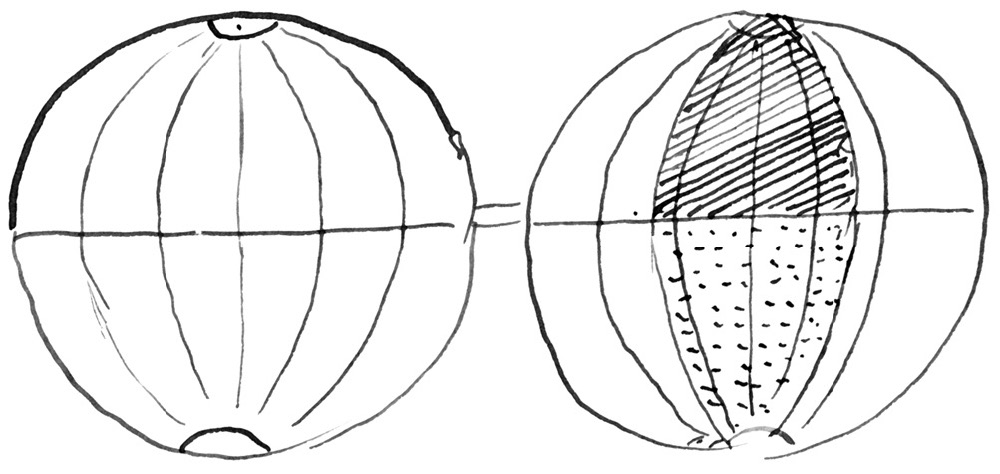From G. H. Darwin 31 May 1876
Trin. Coll.
Thursd. May. 31. 76.
My dear Father,
I’ve been very lazy about writing but I’ve been so saturated with Mathcs. that I’ve hardly been rational. After untold bunglings I’ve at last got my paper into some sort of shape, & I’ve actually done the fatal deed of writing to Adams.1 I shall be in an awful fright when he looks at it—if he will do so. I have improved the Mathcs. so much that it all deals in generalities up to the last & then by putting a few numbers in a pretty simple formula it comes out at once. I have worked out 5 different kinds of continents in a very short space The seasons will remain exactly the same, i.e the sun is vertically overhead in the same latitude as before on the 21st. of June; but the Equator is slightly shifted, so that if a man was standing on a spot on the Tropical line during the whole time of the rising of the continent his latitude wd. be slightly altered— In other words the latitude of every place on the globe is changed, but by different amounts in different places.

The greatest result is the one shown in this figure. The world is shown in 2 hemispheres as usual; the shaded part is a shelving table-land with sloping shores & the dotted part is a sea (without any water in it), & the center of the tableland is 10,000 feet high & the center of the sea 10,000 feet deep. Then the change in latitude of the places in the shaded part is 1o35′ & those places wd. have pro tanto a warmer climate. I can see no reason why in geological periods the pole might not wander 5o to 10o from it’s original position. What a change in climate there wd. be in Europe with no Gulf Stream & London in lat. 60o instead of 51o! My formula will do your problem of the present continents2 & what is more to take any combination of them at will, by merely picking a few numbers out of a short table which I propose to make—e.g to combine the rise of S. America with the fall of the Pacific.
I’ve had a very wild idea to-day wh. I shall suggest to Adams. It seems to me that one can connect the obliquity of any one of the planets with its density & if we cd. get their rate of cooling we cd. from their present density & obliquity calculate how long it is since they were nebulous It’ll probably turn into a gigantic mare’s nest.3 However it’s a big notion & I shall be curious to see what Adams thinks of it.
Horace is so very short in his letter that I don’t make out what’s the matter & whether he’s only a little seedy in his usual manner. I hope we shall manage to try the planet together at Clerkenwell.4
Fred Pollock was here on Sunday & tells me that they got about £500 for Clifford & this will give him a good holiday & a good tip too.5 But as he’s as poor as a rat I think it’s well bestowed. He was also asked by Ed. of the ‘Saturday’ to see if I’d ever review scientific books for him & so I’ve said perhaps. I think rather he was asked to recommend someone. Moulton is so busy with law that he’s had to give it up6
F. Balfour has been made a lecturer, wh. I’m sorry for in some ways, tho’ it’ll be excellent for the place.7
What a monstrous perversion of the Vivisec. Commissions recommendation this bill is.8 Foster says if it passes as it is, it’ll absolutely close the physiolog. School here;9 but I think that’s rather too strong a view. Rayleigh is going to propose a lot of amendments in the Lord’s wh. Frank B. has been talking to him about.10
Frank (D.) was to have come here on Sunday with Crawley but he did’nt come, nor was he at Physiolog. Soc dinner on Friday.11 I do’nt know why.
Yours affectionately | G H Darwin
What big political News!12
Footnotes
Bibliography
Alum. Cantab.: Alumni Cantabrigienses. A biographical list of all known students, graduates and holders of office at the University of Cambridge, from the earliest times to 1900. Compiled by John Venn and J. A. Venn. 10 vols. Cambridge: Cambridge University Press. 1922–54.
Darwin, George Howard. 1877. On a suggested explanation of the obliquity of planets to their orbits. Philosophical Magazine 5th ser. 3: 188–92.
French, Richard D. 1975. Antivivisection and medical science in Victorian society. Princeton, N.J.: Princeton University Press.
Moulton, Hugh Fletcher. 1922. The life of Lord Moulton. London: Nisbet & Co.
ODNB: Oxford dictionary of national biography: from the earliest times to the year 2000. (Revised edition.) Edited by H. C. G. Matthew and Brian Harrison. 60 vols. and index. Oxford: Oxford University Press. 2004.
Report of the Royal Commission on vivisection: Report of the Royal Commission on the practice of subjecting live animals to experiments for scientific purposes; with minutes of evidence and appendix; 1876 (C.1397, C.1397-1) XLI.277, 689. House of Commons Parliamentary Papers.
Wirthwein, Walter George. 1935. Britain and the Balkan crisis: 1875–1878. New York: Columbia University Press.
Summary
His paper on the alterations of the poles and changes in level of continents is in shape.
Sends Cambridge news.
Letter details
- Letter no.
- DCP-LETT-10519
- From
- George Howard Darwin
- To
- Charles Robert Darwin
- Sent from
- Trinity College, Cambridge
- Source of text
- DAR 210.2: 53
- Physical description
- ALS 8pp
Please cite as
Darwin Correspondence Project, “Letter no. 10519,” accessed on 20 April 2024, https://www.darwinproject.ac.uk/letter/?docId=letters/DCP-LETT-10519.xml
Also published in The Correspondence of Charles Darwin, vol. 24


